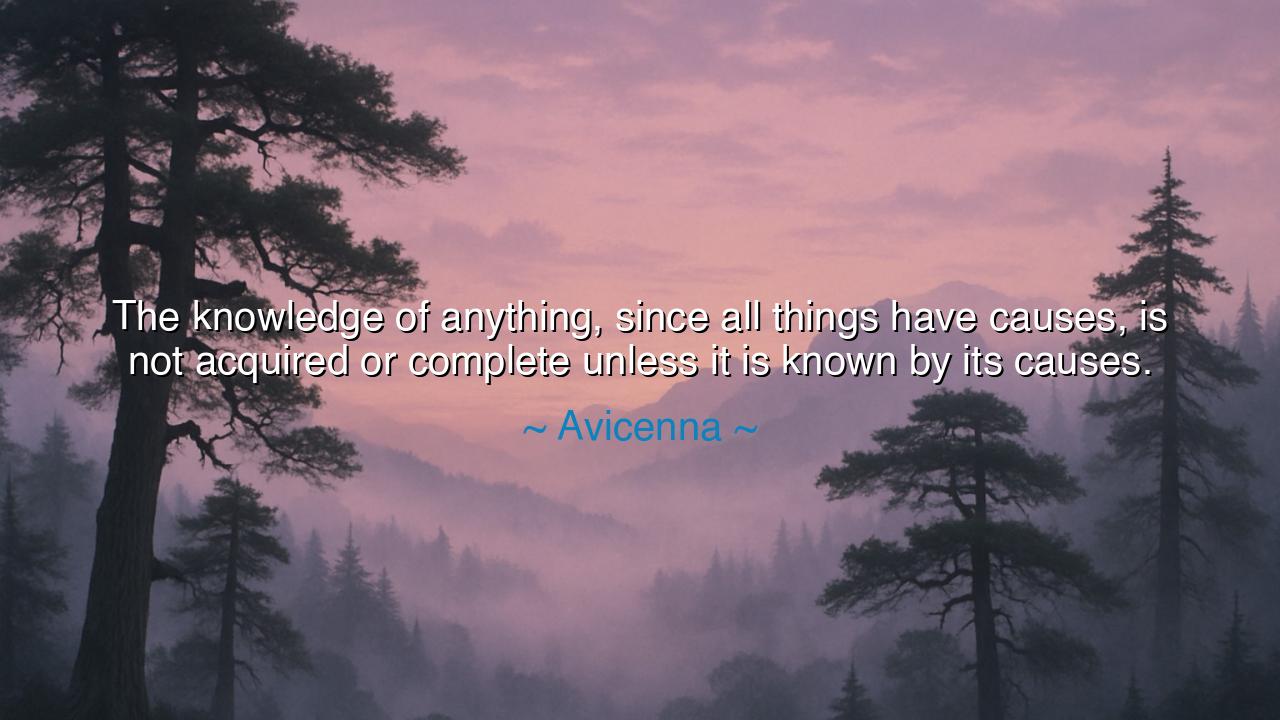
The knowledge of anything, since all things have causes, is not
The knowledge of anything, since all things have causes, is not acquired or complete unless it is known by its causes.






Hear the profound teaching of Avicenna, master of medicine and philosopher of the East, who declared: “The knowledge of anything, since all things have causes, is not acquired or complete unless it is known by its causes.” These words shine like a torch in the cavern of human thought, guiding us to the heart of true wisdom. For it is not enough to know that something is, nor even to describe its shape and sound—we must seek the cause, the root from which it springs, if we would call our understanding complete.
The meaning of causes lies at the core of human inquiry. To know the effect without the cause is to see only the shadow, not the form that casts it. One may observe the falling of an apple, but without knowing the law of gravity, such knowledge is partial, fragile, and incomplete. Avicenna reminds us that knowledge must not stop at appearances. True wisdom pierces the veil and asks, “Why?” For behind every movement, every event, every truth, there is a deeper root, and only when the root is uncovered can understanding be called whole.
This idea reaches back to the ancients themselves. Aristotle, whom Avicenna studied and revered, spoke of the “four causes”—material, formal, efficient, and final. He taught that without knowing these, the essence of a thing could not be grasped. Avicenna carried this torch into the golden age of Islamic philosophy, weaving it with medicine, astronomy, and metaphysics. He believed that a physician who treats the symptoms of illness without knowing the causes cures only the surface, not the sickness itself. Likewise, a philosopher who studies the world without searching for its roots remains forever a child at the threshold of wisdom.
History offers us radiant examples. Consider Louis Pasteur, who saw sickness all around him, yet did not rest until he uncovered the cause of disease—tiny unseen organisms. Before him, doctors could describe fevers, coughs, and sores, but their knowledge was incomplete, for they did not know the cause. Once the cause was found, humanity gained the power to heal, to prevent, and to save countless lives. Here Avicenna’s truth shines clearly: only by knowing causes does knowledge become complete and powerful.
There is danger, too, in neglecting this wisdom. For those who are content with appearances may fall into superstition and error. Ancient peoples once believed that the gods hurled thunder from the heavens in anger. This was knowledge of the effect, but without knowledge of its cause, they trembled in fear rather than harnessing the storm. Only when men like Franklin and Faraday unveiled the causes of electricity did humanity move from terror into mastery. Thus, to accept effects without causes is to remain in chains.
The lesson, beloved seekers, is that wisdom demands depth. Do not stop at the surface of things. When you see a problem, do not rest content with its appearance—search for the cause. When you encounter truth, do not merely repeat it—ask why it is so. When you study the world, do not be content with the leaves and branches—dig until you reach the root. For it is at the root that true knowledge and true power are found.
Therefore, let your practice be this: in every pursuit, seek the cause. If you are a student, do not memorize only—question, inquire, dig deeper. If you are a leader, do not treat only the symptoms of strife—search for its root. If you are a seeker of truth, do not rest until you have pierced through appearances into essence. And remember always the eternal wisdom of Avicenna: knowledge is incomplete without its causes. For it is by knowing causes that humanity rises from ignorance into mastery, from darkness into the light of understanding.






AAdministratorAdministrator
Welcome, honored guests. Please leave a comment, we will respond soon